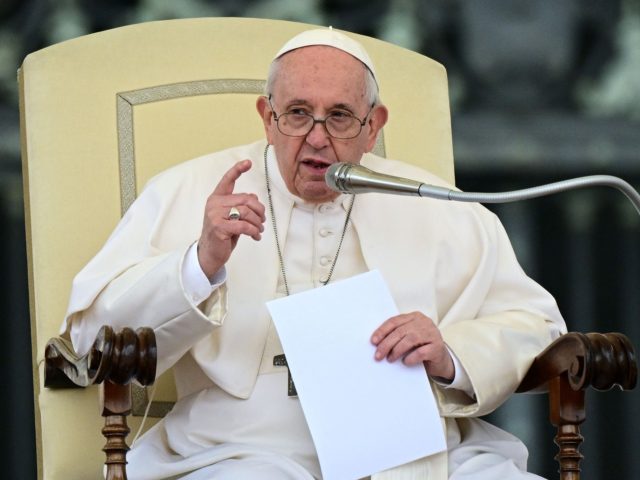ROME — Pope Francis condemned religious hypocrisy Wednesday, insisting it can destroy the faith of entire generations.
Speaking to the crowds gathered in the Vatican for his weekly general audience, the pontiff reflected on the biblical figure of an elderly scribe named Eleazar, who was ordered by the Greek king Antiochus Epiphanes to betray his Jewish faith by eating pork, under pain of death.
Even some of Eleazar’s friends urged him to pretend to eat pork while really eating other meat in order to save his life. Eleazar refused, saying that “many of the young might suppose that Eleazar in his ninetieth year had gone over to an alien religion, and through my pretense, for the sake of living a brief moment longer, they would be led astray because of me, while I defile and disgrace my old age.”
In Wednesday’s address, Pope Francis praised Eleazar as “a wonderful character” who witnessed to “the special relationship that exists between the fidelity of old age and the honor of faith.”
The honor of faith “periodically comes under pressure, even violent pressure, from the culture of the rulers,” Francis said, “who seek to debase it by treating it as an archaeological find, or an old superstition, an anachronistic fetish, and so on.”

Pope Francis arrives in his pope mobile for the weekly general audience in St. Peter’s square at the Vatican on May 4, 2022. (Photo by Vincenzo PINTO / AFP) (VINCENZO PINTO/AFP via Getty Images)
The king’s officials advised Eleazar to resort to a pretense, that is, to pretend to eat the meat without actually doing so, which was a “hypocritical way out,” the pope noted.
“Hypocrisy. Religious hypocrisy. There is so much! There is so much religious hypocrisy, clerical hypocrisy, there is so much,” he said. “These people tell him, ‘Be a little bit of a hypocrite, no one will notice.’”
Yet dishonoring the faith in old age, in order to gain a handful of days, “cannot be compared with the legacy it must leave to the young, for entire generations to come,” Francis said, praising “the consistency of this man who considers the young!”
This is the beautiful and irreplaceable role of the elderly, he declared, because it holds up the faith as a supreme value for which it is worth giving one’s life.
“An elderly person who, because of his vulnerability, accepts that the practice of the faith is irrelevant, would make young people believe that faith has no real relationship with life,” he said. “It would appear to them, from the outset, as a set of behaviors which, if necessary, can be faked or concealed, because none of them is particularly important for life.”
In many sectors of society, “the practice of faith suffers from a negative portrayal, sometimes in the form of cultural irony, sometimes with covert marginalization,” Francis stated, whereby the practice of faith is regarded as “useless and even harmful,” something antiquated or a “disguised superstition.”
“Perhaps it is for us older people – and there are still some here – to give faith back its honor, to make it coherent, which is the witness of Eleazar: consistency to the very end,” he mused. “The practice of faith is not the symbol of our weakness, no, but rather the sign of its strength.”

COMMENTS
Please let us know if you're having issues with commenting.